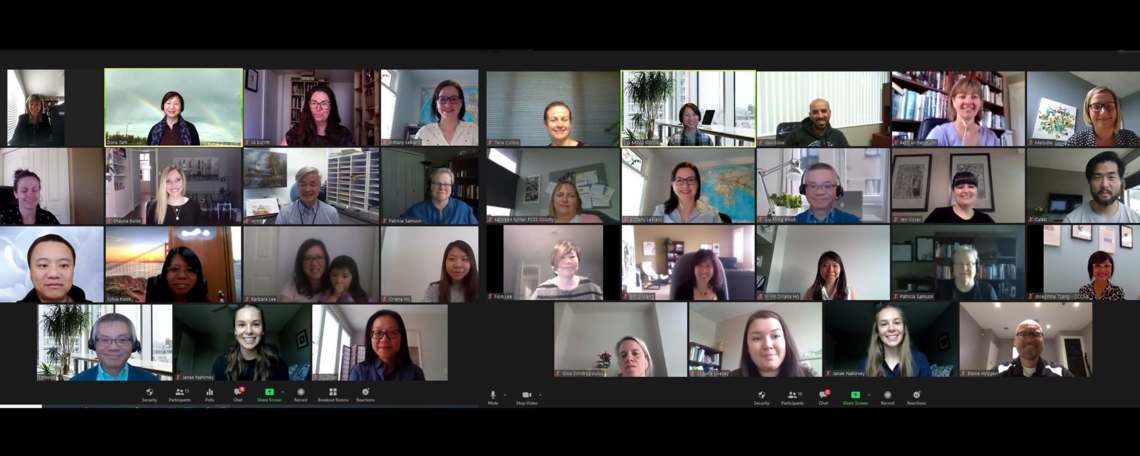Aug. 25, 2020
Study gathers best practices to support children's mental health in China and Canada

One of the most immediate effects of the global pandemic has been increased isolation. Social distancing and quarantining within communities and a closure of borders seemed to threaten decades spent on internationalization and globalization.
A new Social Sciences and Humanities Research Council of Canada (SSHRC) partnership entitled Promising Practices for Children and Youth: A Model of Canada-China Collaboration, is looking to help keep global collaboration alive, while discovering innovative ways to support mental health for children and youth.
“COVID-19 will certainly bring some challenges,” says Faculty of Social Work researcher Dr. Dora Tam, PhD, who is leading the international project. “It will have an impact on our original plans, but we’re confident that the challenges can be handled in a managed way.”

Social Work researcher Dora Tam will draw on her two decades of research on violence against women and children.
Tam is one of four UCalgary scholars to receive SSHRC Partnership Development grants in the 2019-20 competition. This funding supports research activities that include students and emerging scholars, or test out new models of partnership practice. Dr. Byron Miller, PhD; Dr. Gina Starblanket, PhD; and Dr. Charles Tepperman, PhD, of the Faculty of Arts were also awarded funding.
“This funding supports strong, reciprocal partnerships designed to mobilize research,” says Dr. William Ghali, vice-president (research). “SSHRC’s investment will enable our scholars to work closely with community, industry, and government groups toward shared goals that will have long-term impact.”
Mental health a huge concern for children and youth in Canada and China
Tam’s three-year project grew out of her practice and research over the last two decades on violence against women and children. She also leveraged the many contacts she’s forged with researchers and human service agencies in Canada and China.
“Violence in the family impacts the mental well-being of children and youth regardless of their socio-economic and geographical contexts,” she says. “We’ll be looking at promising practices that focus on outcomes. The goal is really to develop user-focused and theory-driven initiatives to promote and intervene on mental wellness among children and youth, aged 12 to 18, in Alberta and Guangdong, China.”
Tam has put together a huge supporting cast of Canadian and Chinese researchers, child and family serving organizations, policy-makers, as well as children, youth and families who in many ways will help guide and lead the direction of the research.
Focus on community-driven initiatives
Mental health is a huge concern for children and youth.
Tam points to World Health Organization statistics that show about 20 per cent of adolescents experience mental health concerns such as depression or anxiety. Sadly, suicide is among the leading causes of death among young people in many places, including Canada and China.
“Canada has a system of well-developed social programs intended to protect the mental well-being of children and youth,” she says, “But we have other challenges related to social inequities that have contributed to higher rates of child poverty, marginalization and discrimination experienced by racialized minority children and youth, as well as a greater proportion of mental health concerns among children and youth from low-income, lone-mother, and newcomer families.”
In contrast, Tam says that China’s economic, industrial and modernization boom over the last 35 years has come with significant social and environmental costs. As parents leave the countryside to work in urban centres, they’re often forced to leave their children behind with grandparents, relatives or other caregivers. These “left behind” children, and other changes in family structure and relations, have had a significant impact on Chinese families.
“Despite the increased standards of living and the growth of the middle class,” she says, “reports of mental health issues, substance misuse, and child neglect or maltreatment in China are well documented. So, we’re really focused on developing community-driven initiatives for the prevention and early intervention of mental health challenges among children and youth in both Canada and China, and to share and exchange best practices.”

Because of COVID-19, researchers have moved many public engagement and collaboration meetings onto platforms like Zoom.
Screen caps Dora Tam
Six cities, two countries
The three-year research project will begin by focusing on three cities each in Alberta and Guangdong, to create an inventory of social service programs for children and youth. Then, using a participatory-action approach, they’ll identify and engage with key stakeholders who work in the area of child and youth mental health.
The original, pre-COVID-19 plan was to create 12 mental health work groups, and to facilitate 12 gamification workshops (each with 10 children/youth), along with six community forums. These forums would generate community action groups purposely created to respond and develop followup actions for the issues and actions recommended by the forums.
“The majority of our activities in stage two and three originally involved face-to-face contacts with different stakeholders,” says Tam. “Due to the uncertainty created by the pandemic, we’re developing back-up plans to maintain social and physical distancing.”
Stage three facilitates international exchange visits in Alberta and Guangdong to promote knowledge transfer, share experiences and perspectives on child and youth mental health, and perhaps most important, to engage service users, service providers, policy-makers, and academic researchers in the co-creation and mobilization of promising practices for child and youth mental health at regional, national, and international levels.
A satisfying project
In many ways the ambitious project is particularly satisfying for Tam, who, along with fellow social work faculty member Dr. Siu Ming Kwok, PhD, have been working on what they call a Canada-China Social Innovation Hub. Over the last 15 years they’ve fostered student and faculty academic exchanges and research collaborations with several Canadian and Chinese universities and community partners.
“I’m very excited because this is a project about community and university collaboration at regional, provincial and international levels," she says. “We’ve also assembled a multidisciplinary team with a wealth of knowledge and experience along with very strong support from our community partners. I’m very much looking forward to this collaborative partnership and the opportunity to introduce the Faculty of Social Work and the University of Calgary to a broader audience.”
The four University of Calgary projects that received SSHRC Partnership Development Grants are:
- Dr. Byron Miller, PhD (Arts): Smart Cities in Global Comparative Perspective: Worlding and Provincializing Relationships
- Dr. Gina Starblanket, PhD (Arts): The Prairie Indigenous Relationality Network
- Dr. Dora Tam, PhD (Social Work): Promising Practices for Children and Youth: A Model of Canada-China Collaboration
- Dr. Charles Tepperman, PhD (Arts): International Amateur Cinema Between the Wars (1919-1939): Amateur Movie Database Partnership Project



